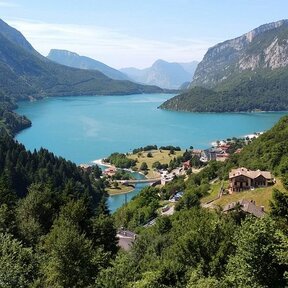On the Alto Adige and demography – Jason Horowitz and Gaia Pianigiani in NYT:
‘In a municipal building in the heart of the alpine city of Bolzano, Stefano Baldo clocked out of work early for his breastfeeding break.
“It’s clear I don’t breastfeed,” Mr. Baldo, a 38-year-old transportation administrator, said in his office decorated with pictures of his wife and six children. But with his wife home with a newborn, one of the parents was entitled by law to take the time, and he needed to pick up the kids. “It’s very convenient.”
Full houses have increasingly become history in Italy, which has one of the lowest birthrates in Europe and where Prime Minister Giorgia Meloni, as well as Pope Francis, has warned that Italians are in danger of disappearing. But the Alto Adige-South Tyrol area and its capital, Bolzano, more than any other part of the country, bucked the trend and emerged as a parallel procreation universe for Italy, with its birthrate holding steady over decades.’
(…)
‘All of that, experts say, helps free up women to work, which is vital for the economy. As in France and some Scandinavian countries, it also shows that a policy of offering affordable day-care services has the power to steer Italy from the impending demographic cliff as the birthrate falls.’
(…)
‘For a good chunk of its history, the Alto Adige area belonged to the assorted empires of Austria, which called it South Tyrol, until Italy annexed it in the early 1900s. It retains a measure of independence over its tax euros and financial decisions, and culturally, it can feel like another, more Austrian world than the rest of Italy. Most people still speak German and are more likely to tuck into bread dumplings than a bowl of pasta.’
(…)
‘The Baldo family said provincial support meant everything to them. As a cake rose in the oven, Ruben, 2, played a children’s song, while his brothers Beniamino, 5, and Gioele, 4, showed off the plastic vegetables in their play kitchen. Their parents sat next to a toy cash register and explained that, like every parent in the province, they received 200 euros a month for each of their six children until they turned 3.
That was on top of the monthly check for 1,900 euros, or about $2,000, they received from the national government for their children.’
(…)
‘Some experts say the province’s attitude toward family benefits is rooted in the desire of a minority culture in a historically disputed area to keep alive a strong identity by encouraging people to have more children. That cultural factor becomes clearer when looking across the border to Trentino, the other — and more culturally Italian — part of the larger region.
Trentino has also invested heavily in child care — a strategy that predates and in some cases outstrips its neighbor. Its birthrate has nevertheless plunged to 1.36 children per woman, much lower than Alto Adige-South Tyrol’s and much closer to the dismal national average.
“The local culture also plays an important role,” said Alessandro Rosina, a prominent Italian demographer. “And that is hard to export.”’
Read the article here.
Money might help a biti of you want to convince citizens to procreate more, but it’s almost never a decisive factor, as we can see in this article.
Culture is more important.
If you want higher birth rates nowadays the fear of extinction must be deep-rooted – if you are willing to engage in ‘demographic warfare’ in order to prevent a region, a culture, a people from disappearing then some money and better government assistance are just not enough.
And many people nowadays prefer pets to children.
Probably sociologists have already been discussing this subject in detail, but a new study won’t hurt.
